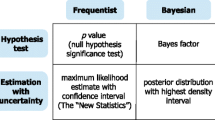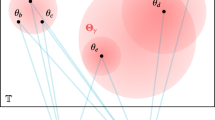Abstract
This paper argues that three plausible principles are mutually inconsistent: (KA) One ought to assert only what one knows; (AP) If it is proper to assert some proposition q, then it is, barring special and not very common circumstances, proper to assert any proposition p from which q has been competently inferred; and (AKN) Some propositions are both properly assertible and known by competent inference from propositions which one does not know. Each pair of two principles constitutes an argument against the remaining principle, but which principle should one drop?
Similar content being viewed by others
Notes
I will not always explicitly mention here that the inference has to be competent. One could also go into several whistles and bells concerning the claim above but they are not relevant to the main points here.
Circumstances are special in the sense relevant to counter-closure just in case (i) they do not concern the epistemic status of the belief in p as true, false, known or not known, playing this, or that inferential role, and (ii) the obtaining of such circumstances explains why it is not appropriate to assert p despite the fact that p is a premise in an inference to another proposition q which is properly assertible by the subject.
For the sake of simplicity, I am leaving aside problems concerning multi-premise inferences (see, e.g., Hawthorne 2004, 46-50, passim); dealing with them would take us off on a tangent—knowledge from falsehood is just one type of case supporting the principle above; knowledge from mere true belief is another one.
Circumstances are special in the sense relevant here just in case their obtaining explains why it is not appropriate to assert some proposition despite the fact that it is known by the subject.
The main argument of this paper also works if one weakens the existential claim (AKN) to a modal claim (AKN-): It is possible that there are propositions which are both properly assertible and known by competent inference from propositions which one does not know.
References
Fitelson, B. (2010). Strenghtening the case for knowledge from falsehood. Analysis, 70, 666–669.
Hawthorne, J. (2004). Knowledge and lotteries. Oxford: Oxford University Press.
Hiller, A. (2013). Knowledge essentially based upon false belief. Logos & Episteme, 4, 7–19.
Klein, P. (2008). Useful false beliefs. In Q. Smith (Ed.), Epistemology. New essays (pp. 25–61). Oxford: Oxford University Press.
Luzzi, F. (2009). Counter-closure. Australasian Journal of Philosophy, 88, 673–683.
Unger, P. (1975). Ignorance. A case for scepticism. Oxford: Clarendon.
Warfield, T. A. (2005). Knowledge from falsehood. Philosophical Perspectives, 19, 405–416.
Williamson, T. (2000). Knowledge and its limits. Oxford: Oxford University Press.
Acknowledgments
I am grateful to students in a former epistemology seminar of mine at Swarthmore, especially to Katherine Sepulveda whose very insightful remarks on knowledge and assertion got me started on this paper.
Author information
Authors and Affiliations
Corresponding author
Rights and permissions
About this article
Cite this article
Baumann, P. Knowledge, Assertion, and Inference. Acta Anal 29, 487–490 (2014). https://doi.org/10.1007/s12136-014-0227-7
Received:
Accepted:
Published:
Issue Date:
DOI: https://doi.org/10.1007/s12136-014-0227-7




